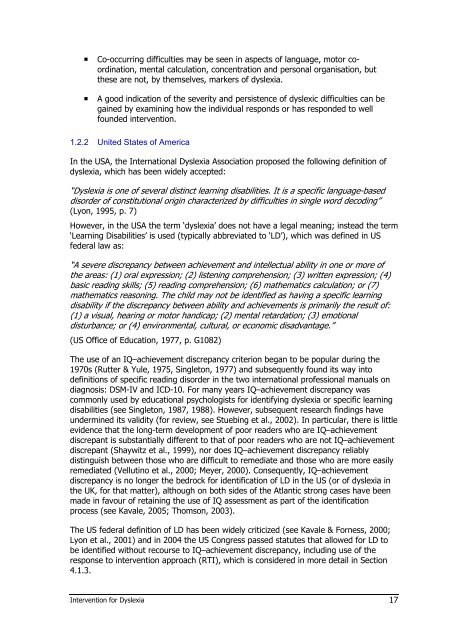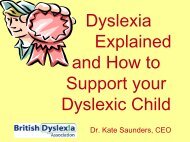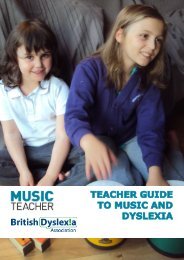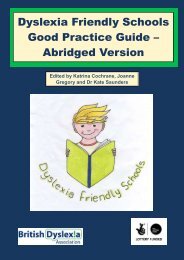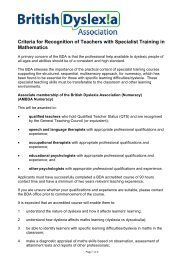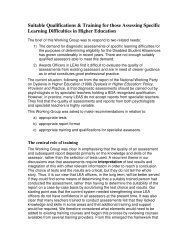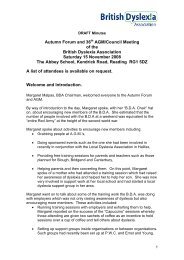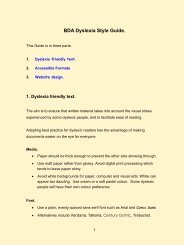Intervention for Dyslexia - The British Dyslexia Association
Intervention for Dyslexia - The British Dyslexia Association
Intervention for Dyslexia - The British Dyslexia Association
You also want an ePaper? Increase the reach of your titles
YUMPU automatically turns print PDFs into web optimized ePapers that Google loves.
Co-occurring difficulties may be seen in aspects of language, motor coordination,<br />
mental calculation, concentration and personal organisation, but<br />
these are not, by themselves, markers of dyslexia.<br />
A good indication of the severity and persistence of dyslexic difficulties can be<br />
gained by examining how the individual responds or has responded to well<br />
founded intervention.<br />
1.2.2 United States of America<br />
In the USA, the International <strong>Dyslexia</strong> <strong>Association</strong> proposed the following definition of<br />
dyslexia, which has been widely accepted:<br />
“<strong>Dyslexia</strong> is one of several distinct learning disabilities. It is a specific language-based<br />
disorder of constitutional origin characterized by difficulties in single word decoding”<br />
(Lyon, 1995, p. 7)<br />
However, in the USA the term ‘dyslexia’ does not have a legal meaning; instead the term<br />
‘Learning Disabilities’ is used (typically abbreviated to ‘LD’), which was defined in US<br />
federal law as:<br />
“A severe discrepancy between achievement and intellectual ability in one or more of<br />
the areas: (1) oral expression; (2) listening comprehension; (3) written expression; (4)<br />
basic reading skills; (5) reading comprehension; (6) mathematics calculation; or (7)<br />
mathematics reasoning. <strong>The</strong> child may not be identified as having a specific learning<br />
disability if the discrepancy between ability and achievements is primarily the result of:<br />
(1) a visual, hearing or motor handicap; (2) mental retardation; (3) emotional<br />
disturbance; or (4) environmental, cultural, or economic disadvantage.”<br />
(US Office of Education, 1977, p. G1082)<br />
<strong>The</strong> use of an IQ–achievement discrepancy criterion began to be popular during the<br />
1970s (Rutter & Yule, 1975, Singleton, 1977) and subsequently found its way into<br />
definitions of specific reading disorder in the two international professional manuals on<br />
diagnosis: DSM-IV and ICD-10. For many years IQ–achievement discrepancy was<br />
commonly used by educational psychologists <strong>for</strong> identifying dyslexia or specific learning<br />
disabilities (see Singleton, 1987, 1988). However, subsequent research findings have<br />
undermined its validity (<strong>for</strong> review, see Stuebing et al., 2002). In particular, there is little<br />
evidence that the long-term development of poor readers who are IQ–achievement<br />
discrepant is substantially different to that of poor readers who are not IQ–achievement<br />
discrepant (Shaywitz et al., 1999), nor does IQ–achievement discrepancy reliably<br />
distinguish between those who are difficult to remediate and those who are more easily<br />
remediated (Vellutino et al., 2000; Meyer, 2000). Consequently, IQ–achievement<br />
discrepancy is no longer the bedrock <strong>for</strong> identification of LD in the US (or of dyslexia in<br />
the UK, <strong>for</strong> that matter), although on both sides of the Atlantic strong cases have been<br />
made in favour of retaining the use of IQ assessment as part of the identification<br />
process (see Kavale, 2005; Thomson, 2003).<br />
<strong>The</strong> US federal definition of LD has been widely criticized (see Kavale & Forness, 2000;<br />
Lyon et al., 2001) and in 2004 the US Congress passed statutes that allowed <strong>for</strong> LD to<br />
be identified without recourse to IQ–achievement discrepancy, including use of the<br />
response to intervention approach (RTI), which is considered in more detail in Section<br />
4.1.3.<br />
<strong>Intervention</strong> <strong>for</strong> <strong>Dyslexia</strong> 17


